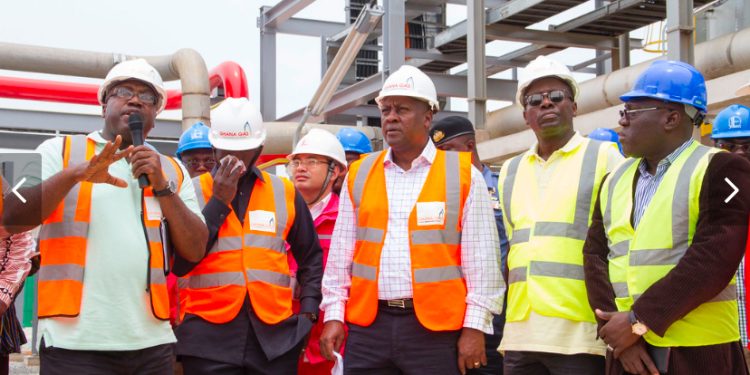President John Dramani Mahama has announced cabinet approval for the construction of a second gas processing plant aimed at doubling Ghana’s national gas processing capacity.
In his first press briefing since taking office, President Mahama revealed that the new facility, known as GPP-2, will enhance the country’s power generation by providing cheaper, cleaner, and more reliable energy.
He said “We’ve also approved the construction of a second gas processing plant, GPP-2, to double our national processing capacity and set the stage for cheaper, cleaner, and more reliable power generation.”
He highlighted the economic benefits of the project, stating it is expected to save Ghana nearly US$500 million every two years by reducing dependency on costly imported liquid fuels.
President Mahama indicated “This landmark project alone is expected to save the country close to US$500 million every two years by drastically cutting our reliance on expensive imported liquid fuel.”
The president also emphasized the job creation potential, projecting over 1,000 direct and indirect employment opportunities from the project, which will stimulate industrial growth and support livelihoods.
Addressing the nation’s power situation, President Mahama said the threat of widespread electricity outages, or “dumsor,” inherited at the start of the year, has been successfully tackled.
He remarked “We can all attest to the fact that the looming threat of dumsor we inherited in January this year has been averted.
“Through strategic interventions and swift action, power supply has remained stable across the country, ensuring uninterrupted electricity for households, businesses, and essential services,” he added.
Background to First Gas Plant In Ghana:
The first gas processing plant in Ghana is the Atuabo Gas Plant, located in the Western Region. Construction began in July 2011 as part of the Western Corridor Gas Project, aimed at establishing integrated gas processing infrastructure to monetize natural gas from the Jubilee Oil Field and other oil fields.
The plant processes natural gas into liquefied petroleum gas (LPG) for domestic use and contributes significant power megawatts to the national grid.
Before the Atuabo plant was operational, Ghana relied entirely on natural gas imports from Nigeria through the West African Gas Pipeline, which faced reliability issues.
The plant was designed to reduce Ghana’s dependence on imported gas by processing domestic associated natural gas that was previously flared.
The project was financed with a US$3 billion loan from China Development Bank and the Chinese government, with construction led by Sinopec.
Despite financial, legal, and land acquisition challenges causing delays, the plant’s infrastructure was mechanically completed in late 2014 and fully commissioned in April 2015.

The plant has a nominal processing capacity of about 150 million standard cubic feet per day (mmscf/d) and is a key component in Ghana’s efforts to stabilize and increase energy supply with domestically sourced gas.
It also produces LPG to meet a large portion of the country’s domestic demand, reducing reliance on imports and strengthening energy security.
Source: www.Kumasimail/Kwadwo Owusu

































































